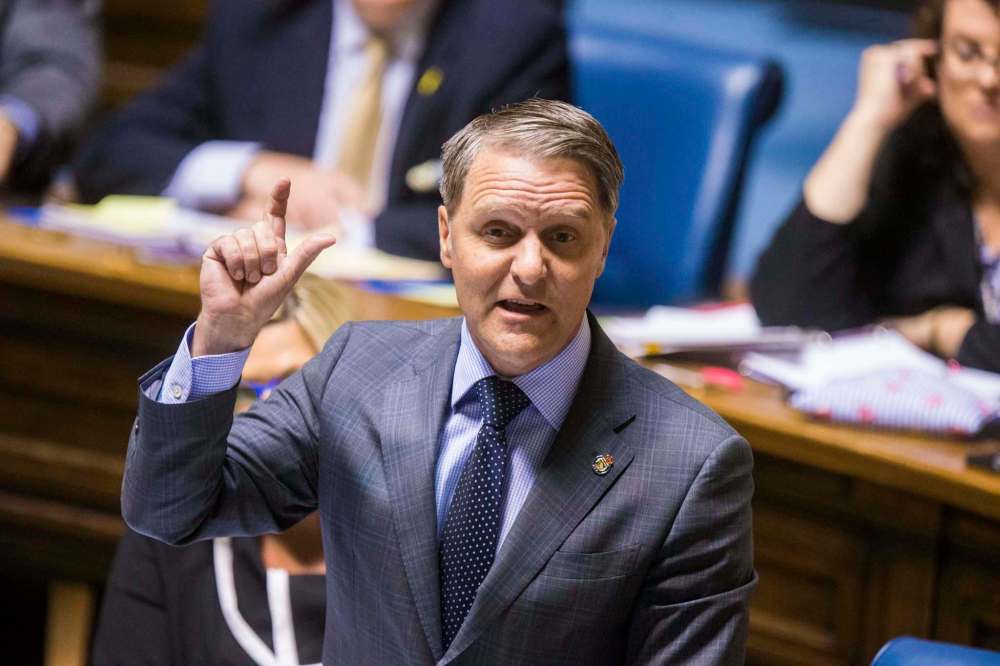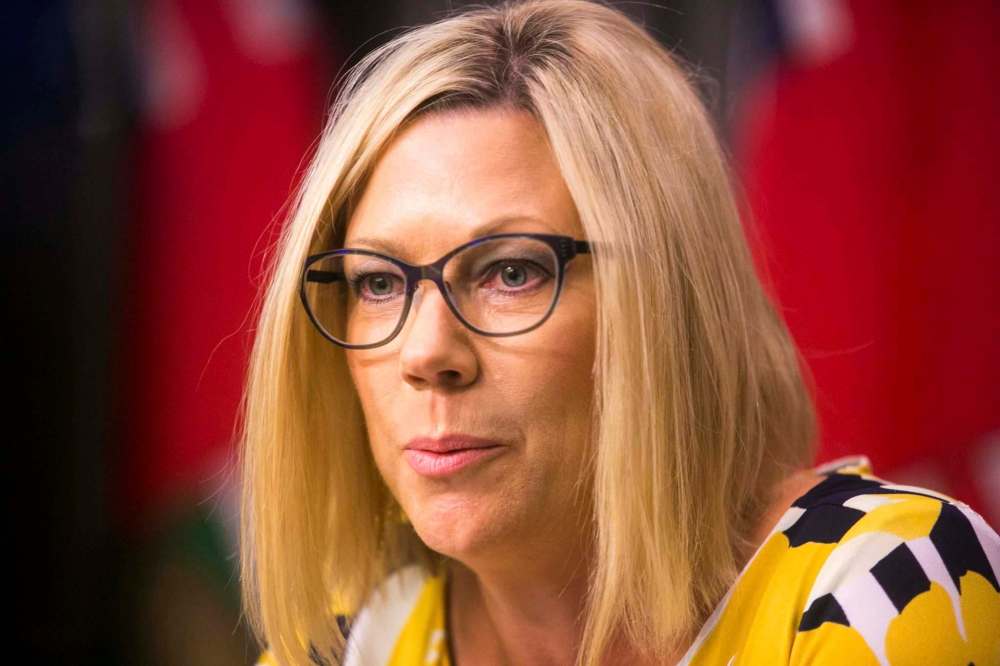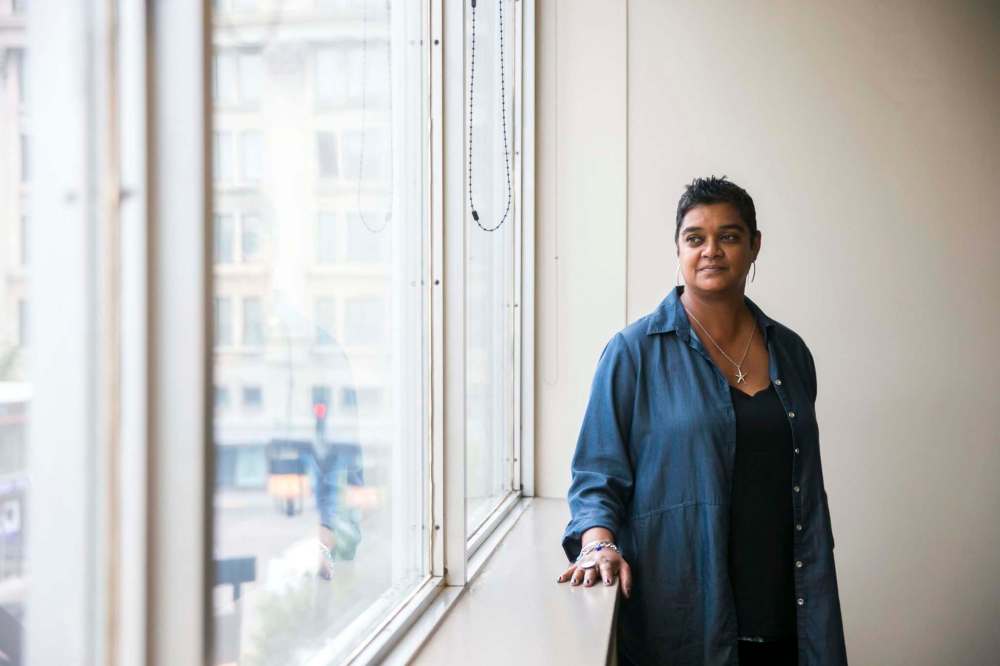Squires to keep reproductive-rights file
Critics say issue belongs under health portfolio, not with status of women minister
Advertisement
Read this article for free:
or
Already have an account? Log in here »
To continue reading, please subscribe:
Monthly Digital Subscription
$0 for the first 4 weeks*
- Enjoy unlimited reading on winnipegfreepress.com
- Read the E-Edition, our digital replica newspaper
- Access News Break, our award-winning app
- Play interactive puzzles
*No charge for 4 weeks then price increases to the regular rate of $19.00 plus GST every four weeks. Offer available to new and qualified returning subscribers only. Cancel any time.
Monthly Digital Subscription
$4.75/week*
- Enjoy unlimited reading on winnipegfreepress.com
- Read the E-Edition, our digital replica newspaper
- Access News Break, our award-winning app
- Play interactive puzzles
*Billed as $19 plus GST every four weeks. Cancel any time.
To continue reading, please subscribe:
Add Free Press access to your Brandon Sun subscription for only an additional
$1 for the first 4 weeks*
*Your next subscription payment will increase by $1.00 and you will be charged $16.99 plus GST for four weeks. After four weeks, your payment will increase to $23.99 plus GST every four weeks.
Read unlimited articles for free today:
or
Already have an account? Log in here »
Hey there, time traveller!
This article was published 03/08/2018 (2692 days ago), so information in it may no longer be current.
Manitoba has a new health minister who, like his predecessor, won’t be the government’s spokesman on women’s reproductive health or reproductive rights.
Cameron Friesen, who was appointed to the new position Wednesday after being finance minister since 2016, said Rochelle Squires, the minister responsible for the status of women, will continue to represent the government on those files.
“In my conversations thus far with the premier, I believe that we will continue in the same approach that we’ve done thus far with those issues entrusted to the minister responsible for women’s issues,” Friesen said.

“I don’t think that there’s any Manitoban who is disputing the fact that health is big. So I believe I will have plenty to occupy my time with. That minister (Squires) has already some expertise with her time on that file.”
The NDP repeatedly criticized former health minister Kelvin Goertzen for deflecting questions about abortions and the pregnancy-termination medication Mifegymiso to Squires.
NDP health critic Andrew Swan went on the offensive again Wednesday.
“It’s weird to have another male health minister who is not allowed to talk about female parts. Look: women’s reproductive health is very important — not just to 50 per cent of the population, but to most of the population,” Swan said.
“And to have a health minister… to have a new male minister who’s not going to talk about things like the abortion pill, who’s not going to talk about providing reproductive services is a big mistake and it’s not fair to Manitoba women.”
In an interview, Squires said she is proud to advance women’s issues and is “always passionate about all things pertaining to women and equality in the province of Manitoba.” She talked about teamwork among cabinet ministers and said Premier Brian Pallister has empowered all members to work together.

“It’s an honour to be the minister responsible for the status of women and I will continue to do that. I will also be hosting my first gender-based violence committee of cabinet very soon. It is something that we had announced awhile ago because it’s reflective of women’s issues, they transcend all cabinet portfolios and all government departments. So it’s really bringing all ministers together so that we can ensure that we’re advancing women’s issues at an appropriate pace,” she said.
Nadine Sookermany, executive director of the Women’s Health Clinic in Winnipeg, was critical of the government.
“In (Wednesday’s) cabinet shuffle, the government… had an opportunity to respond to the concerns raised by Manitobans about not including abortion under the health portfolio and they chose not to respond. Continuing to exclude reproductive and sexual health from the health portfolio, while continuing to place it under the status of women, dismisses it from being a health issue,” she wrote in an email.
“An abortion is one of the most common medical procedures Canadians receive. While we appreciate Minister Squires’ work on access to abortion, in order to further promote access for northern and rural areas, this health service needs to be provided within the framework of an equitable health care policy and not simply women’s rights. Health care is health care.”
On Thursday, the Free Press asked spokespeople from all provincial and territorial health offices whether their health ministers were responsible for discussing women’s health issues, or if they relegated the duty to another minister. Eight of 13 responded.
Representatives from British Columbia, Alberta, Yukon, Ontario, Quebec and Newfoundland and Labrador said their health ministers are in charge of women’s health duties. A spokesperson from Nova Scotia said their health department provides leadership and will consult with other authorities, like a status of women council, as needed.

In Saskatchewan, some health-care issues “have wide implications for all of government and therefore require ministers from different portfolios to collaborate,” a government spokesperson said in an email, noting these decisions are “made on a case-by-case basis.”
jessica.botelho@freepress.mb.ca
Twitter: @_jessbu
History
Updated on Friday, August 3, 2018 10:43 AM CDT: Adds Ontario response.


